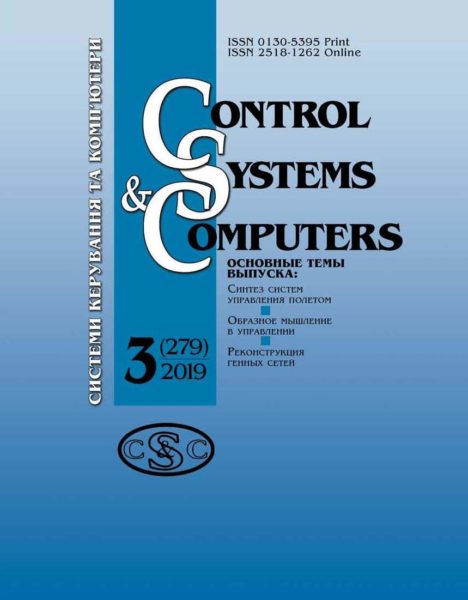Control Systems and Computers, N2, 2020, Article 6
https://doi.org/10.15407/csc.2020.02.055
Control Systems and Computers, 2020, Issue 2 (286), pp. 55-65.
UDC 621.311.2
V.V. OSYPENKO, Doctor (Eng.), Professor, Kyiv National University of Technologies and Design, 2, Nemirovich-Danchenko str.,01011, Kyiv, Ukraine, vvo7@ukr.net
V.V. KAPLUN, Doctor (Eng.), Professor, National University of Life and Environmental Sciences of Ukraine, 15 Heroes of Defense Street, 03041, Kyiv, Ukraine, wwwanten@gmail.com
M.O. VORONENKO, PhD (Eng.), Associate Professor, Kherson National Technical University, 24, Beryslavske Shose Str., 73008, Kherson, Ukraine, mary_voronenko@i.ua
DYNAMIC VALUATION MODELLING OF COST AND ELECTRICITY CONSUMPTION OVER LOCAL OBJECTS WITH INTELLECTUAL GOVERNANCE
The work is devoted to the further development of the theory of intelligent electric power management systems construction for local objects with several heterogeneous (traditional and renewable) energy sources. The scientific idea is based on the use of modern information systems and technologies and is to improve the energy efficiency of the micro-energy networks of local objects based on the dynamic estimation of the real-time electricity cost and the transmission of this information to the user with the agreed discretion for matching the load schedule (or demand schedule). The method of dynamic planning of energy use in micro-energy systems and principles of building intelligent energy management systems of local objects are developed, on the basis of which the user will be able to control the load levels in real-time and optimize the energy costs, which in turn will lead to balancing of the microelectric network and increase the efficiency of its functioning. It is proved that the proposed solutions for the formation of control and technological functions can be used to improve the intelligent control systems in technologies smart microgrid, smart house, etc.
Download full text! (On English)
Keywords: microenergy networks, local energy object, renewable energy sources, dynamic modeling of electricity cost, intelligent control system, dispatching – technological functions.
- State Statistics Service of Ukraine. [online] Available at: <http://www.ukrstat.gov.ua/>. [Accessed 06 Dec. 2010]. (in Ukrainian).
- Kaplun, V.V., 2016. “Derzhavna sluzhba statystyky Ukrayiny”., Visnyk KNUTD, 3 (98), pp. 52-58. (in Ukrainian).
- Osypenko, V.V., 2014. “Two approaches to solving the problem of broad-based clustering from inductive modeling positions”., Byuleten NUBiP Ukrayiny Ser. Enerhetyka ta avtomatyka, elektronne fakhove vydannya, 1, pp. 83-97, http://nbuv.gov.ua/j-pdf/eia_2014_1_11.pdf. (in Ukrainian).
- Solar energy is one of the promising directions for the development of renewable energy in Ukraine. Government portal. [online] Available at: <http://www.kmu.gov.ua/control/publish/article?art_id=248970577>. (in Ukrainian).
- Strukturno-parametrychnyy syntez kombinovanykh system elektrozhyvlennya, kolektyvnamonohrafiya, prof. Kaplun V.V. (ed.), 2017. KNUTD, Kyiv, 189 p. (in Ukrainian).
- Kim, B.-G., Zhang, Y., van der Schaar, Lee, J.-W., 2014. “Dynamic pricing for smart grid with reinforcement learning”, IEEE CCSES (IEEE NFOCOM Workshop).
https://doi.org/10.1109/INFCOMW.2014.6849306 - Borenstein, S., Jaske, M., Rosenfeld, A., “Dynamic pricing, advanced metering, and demand response in electricity markets”, Center for the Study of Energy Markets. [online] Available at: <https://escholarship.org/uc/item/11w8d6m4>. [Accessed 21 Sept. 2016].
- Dang, T., Ringland, K., 2012. “Optimal load scheduling for residential renewable energy integration”, IEEE 3rd International Conference on Smart Grid Communications, Smart Grid Comm., pp. 516-521.
https://doi.org/10.1109/SmartGridComm.2012.6486037 - Dupont, B., Jeroen, T., Ronnie, B., 2012. “Automated residential demand response based on dynamic pricing”, 2012 3rd IEEE PES International Conference and Exhibition on Innovative Smart Grid Technologies (ISGT Europe), Berlin, pp. 1-7.
https://doi.org/10.1109/ISGTEurope.2012.6465806 - Faruqui, A., Sergici, S., Akaba, L., 2014. “The impact of dynamic pricing on residential and small commercial and industrial usage: New experimental evidence from Connecticut”, The Energy Journal, 35 (1), 137-160.
https://doi.org/10.5547/01956574.35.1.8 - Holtschneider, T., Erlich, I., 2013. “Optimization of electricity pricing considering neural network based model of consumers’ demand response”, 2013 IEEE Symposium on Computational Intelligence Applications in Smart Grid (CIASG), Singapore, pp. 154-160.
https://doi.org/10.1109/CIASG.2013.6611512 - Ivakhnenko, A.G., Madala, R., 1994. Inductive learning algorithms for complex systems modelling, CRC Press, Boca Raton, 350 p.
- Ivakhnenko, A.G., 1987. “Objective Computer Clusterisation Based on Self-Organisation Theory”, Soviet Automatic Control, 20 (6), pp. 1-7.
- Ivakhnenko, A.G., Osypenko, V.V., 1984. “Prediction of Rare Events on the Basis of the GMDH Algorithm”, Scripta Technica Inc., U.S.A, Soviet Automatic Control, 5 (17), pp. 6-10.
- Lee, J.-W., Lee, D.-H., 2011. “Residential electricity load scheduling for multi-class appliances with time-of-use pricing”, IEEE GLOBECOM Workshops.
https://doi.org/10.1109/GLOCOMW.2011.6162370 - Mohsenian-Rad, H., Leon-Garcia, A., 2010. “Optimal residential load control with price prediction in real-time electricity pricing environments”, IEEE Transactions on Smart Grid., 1 (2), pp. 120-133.
https://doi.org/10.1109/TSG.2010.2055903 - Osypenko, V., Kaplun, V., 2017. “About the intelligent decision making system for dynamic electricity pricing on renewable microgrids”, Proc. of the XII IEEE Int. Conf. CSIT-2017 & Int. Workshop on Inductive Modelling, September 05-08, 2017, Lviv, Ukraine, Vezha&Co, Lviv, pp. 348-350.
- Thimmapuram, P.R., Kim J., 2013. “Consumers’ price elasticity of demand modelling with economic effects on electricity markets using an agent-based model”, IEEE Transactions on Smart Grid, 4 (1), pp. 390-397.
https://doi.org/10.1109/TSG.2012.2234487
Received 14.03.2020



